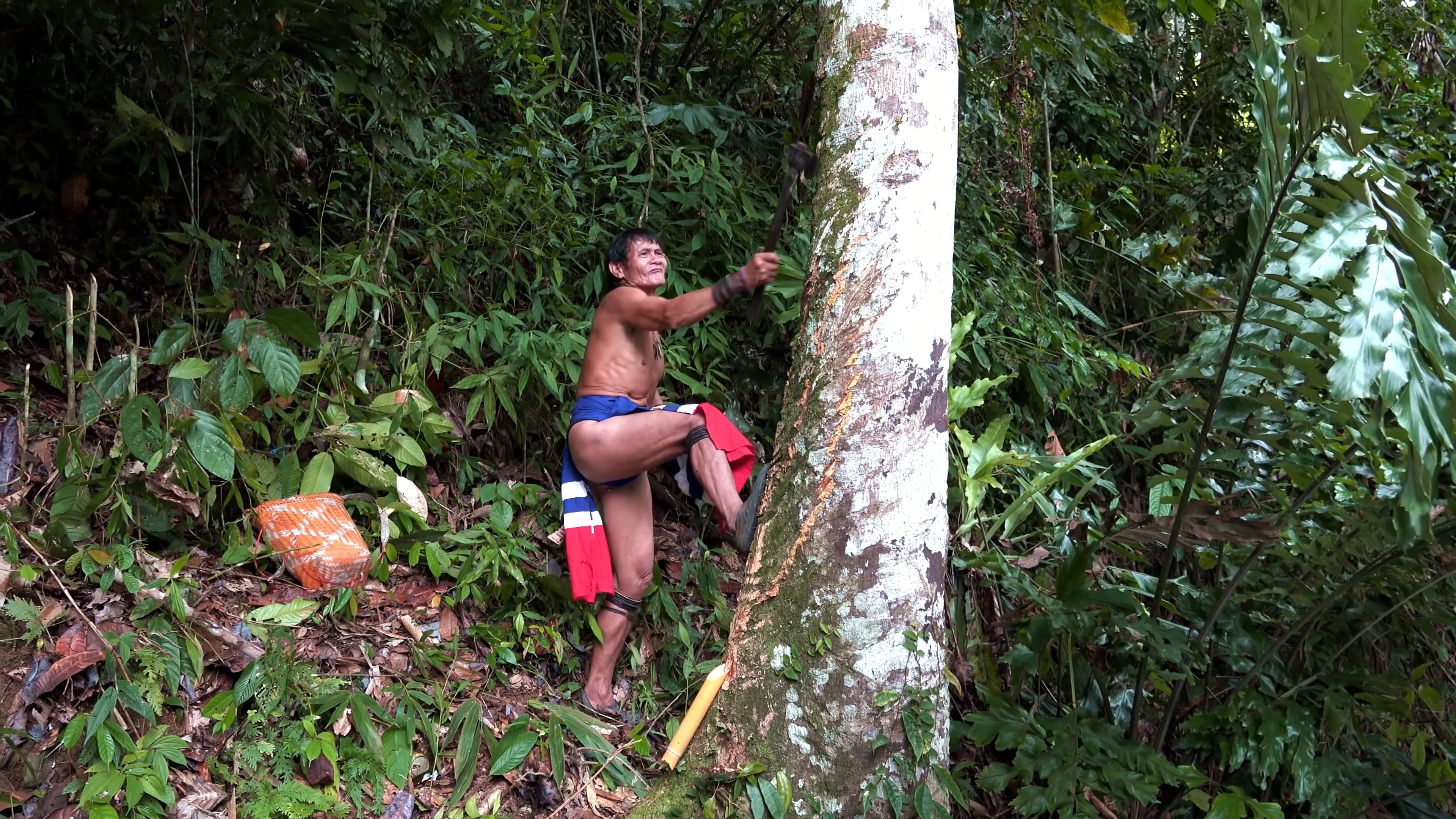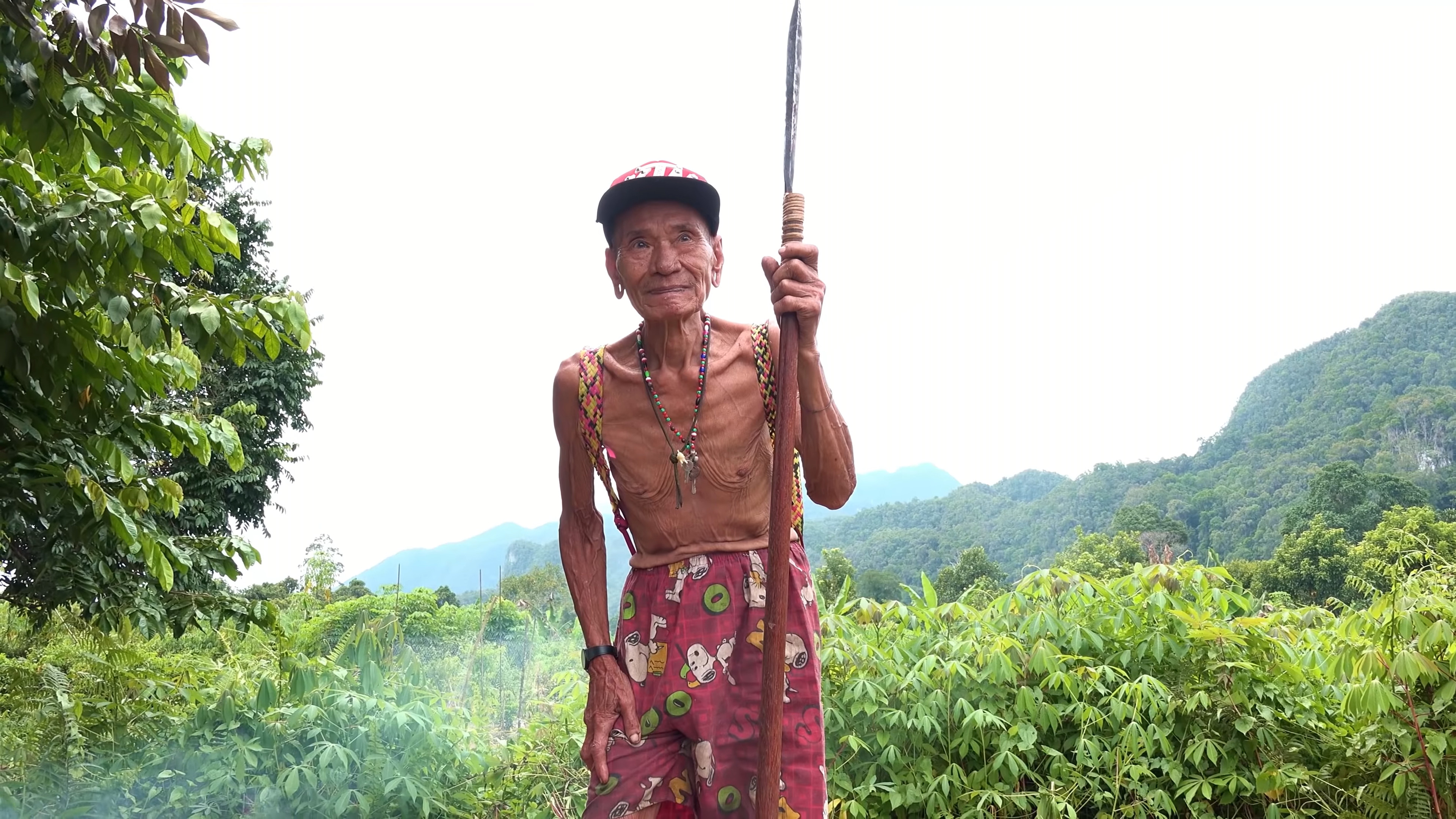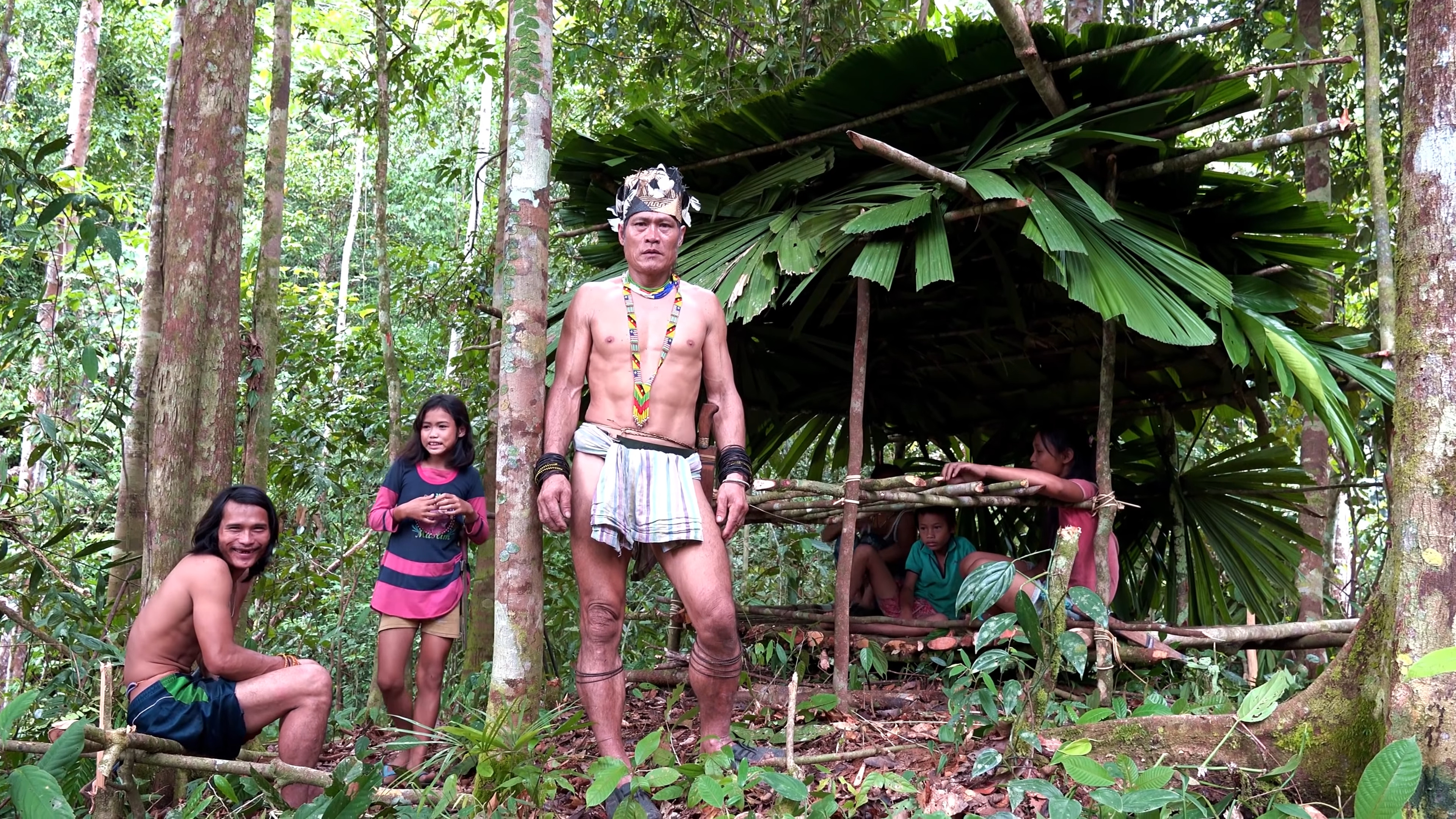siiky
2023/05/20
2024/01/02
2024/01/02
video,documentary,life,nature,music
Mindblowing documentary about a couple of indigenous peoples of the Borneo island: Penan and Iban. Raphael Treza goes to Sarawak, the Malaysian part of the Borneo island, to live for 3 months with the Penan. Mentions the palm oil industry a few times, and shows images of its effects, including deforestation (though not caused by the palm oil industry alone).
@2m32s smart! A logging truck goes by, the trailer doesn't have walls or floor, just a few poles to keep the tree trunks in place.
Mentions the activists Bill Kayong and Bruno Manser.
Half of all the world's tropical timber comes from Borneo. Cut down areas are used for rubber and palm plantations. Both are used widely in packaged supermarket products.
@3m57s a tree with weird roots.
Borneo's rainforest is one of the oldest and most diverse ecosystem on Earth: 1/3 of all plant species; ~30M insect species. Less than 10% of Sarawak's forest remains intact.
~15k Penan people lived in the forest when the Malaysian government started pushing them out.
Starting @5m45s Bala shows how to make Tajem, the poison the Penan use for hunting, created mainly from the Tajem tree (Antiaris toxicaria). The tree's sap alone is deadly, causing the heart to stop, but the Penan add a few more ingredients to make it even stronger. The whole process, from start to finish, is simply impressive. Bala uses a bamboo container for the sap, scrapes a bit off the tree's bark, makes a cut to fit and hold the bamboo container, and then makes some diagonal chops along the tree's trunk to bleed the sap. When he gets back "home", he pours the sap into a boat-looking pot made out of dry green leaves, held in shape by a straw at the middle. The extra ingredients are the "selu kaleu" plant (crushed and squeezed), and ashes of a burnt "tuak" toxic vine. Mix all together, coat the darts, and dry them with fire.

Bala is already an old geezer (50+yo I guestimate) but @7m22s you can see him leaning on the tree with his foot, a real survivor: no fat anywhere, just the right amount of muscle.
@13m5s Richard shows up for the first time playing some strings instrument. He works at one of the nearby national parks, and is one of the few people still legally allowed to hunt traditionally (with a blowpipe).
@14m59s he skewers three bamboo shoots to carry home. Bamboo shoots have cyanide, but can be boiled to clean it.
@15m35s the Penan are still legally allowed to fish inside the national parks, which they do using homemade spearguns.
@17m14s Langub, a sedentary Penan, guides Raphael to meet other semi-nomad Penans.
@18m18s "dian" means "good"! Saya appears for the first time. He lives with his wife, 2 sons (Tyon and Ajai), and 2 daugters. Women's names are kept secret to outsiders. They eat rice, turtle, and a tapioca-based jam/jelly-like thing called "naon".
The sagu palm tree was traditionally their main source of food. Saya goes with Raphael to show him collecting one. They cut the tree down but without damaging the roots. He extracts the core of the trunk. Scrapes "jakah" moss off, to use as a fire starter. The core of the core can be eatten raw or made into flour.
@20m8s Saya shows "oroo", the Penan way of communicating with passers-by through signals (sticks, leaves, ...). It always starts with a Penan expression, "jah kenin jah kenin", which means "we have the same heart", and lets other Penan know the sender is also a Penan. With a bunch of combinations they can let other people about the way to villages, if there's enough food in camp (an invitation to share food), if anyone got bit by a snake and needs medicinal plants, how many families in camp, if they're cooking meat, if they're fishing at the river, ... Just amazing.
@22m19s The Penan forced out of their traditional lifestyle live in shared "longhouses" made by the government for them. They craft woven bags and such made out of "rattan", a long vine that can also be used as a toothbrush if crushed. They used to worship the Ballei, the spirit of the forest, before they were christianized.
@23m8s Nyapun (probably 89yo) was one of the Penan chiefs forced to "settle down". A little more is explained about their traditional way of life. In the past, the canopy of the forest was so dense they couldn't see the sky and count the moon phases or years passing by, they lived in the present. Nyapun's (second) wife plays nose flute. The Penan practice polygamy (both ways, polygyny and polyandry).

Now we need money for everything, and it's very hard to get. We are not as strong as before, that's why we don't know what to do. It was nice in the jungle everything was free. We could find animals next to our huts. It was happy. We want to thank you for visiting us.
@26m24s Raphael goes to a new Penan village. The older people, who were used to the nomadic way of life, have come to suffer from depression and dementia.
@28m20s back with Bala, who shows how to make Penan bark cloth. Starts off by cutting down a beripun tree and beating it with a stick to remove the bark from the trunk. Then cuts the bark length-wise and removes it from the trunk. Finally, beats the bark again against a hard surface to soften it.
There are about 1500 plant names in the Penan language.
@29m51s talks about a medicinal plant used to treat poisonous snake bites: "penawat torok" (raspy 'r'; "torok" means "snake"?). Works for all snakes.
@31m19s Bala cuts a bit of "penawat torok" for Raphael. Raphael thanks him but Bala doesn't react at all. (TODO)
@31m28s "kratom" is another medicinal plant, used to treat opium and alcohol addiction, fever, and relieve stress and anxiety. Used as tea?
@31m50s Raphael travels to meet the Iban people, also known as Lakya ("the strong men"). The used to head-hunt other tribes, including Penan. You can still see trophies in some of their houses. "Ketam itit" (shoulder blade tattoo), "bungai terung" (eggplant flower tattoo on the shoulders), "uker degok" (throat tattoo for protection), "entegulun" (hand tattoo made after the first head taken).
@34m7s back with Saya, they're preparing to leave camp for a new settlement. @35m10s they actually start building a temporary shelter. Saya has massive calves! And his son has bare feet. They have to build the shelter in less than 1h because the weather is so unpredictable. Really amazing to see their shelter building skills: knots, horizontal beams notched into vertical beams, horizontal bars notched into other horizontal bars to be held into place, ... Huge leaves are pricked together (to be used as shingles), and Saya's wife and older daughter clearly have lots of experience doing it. The younger daughter is weaving leaves (not sure about their purpose).

All these trees, we don't want them to be destroyed. Right now we are at the camp, but not for a long time.
(...)
We are about to leave to the other side of the forest to find more sagu trees.
(...)
The Malaysian government tells us to leave the forest, they say they want to help us, but if we leave the forest they don't help us at all. I hope in your country, people will want to help us. That's what I wanted to tell you.
They use a plant candle made from the pod of a vine for light during the night. Lasts up to 1h. And they dry some freshly cut "punyau" (a wood that catches fire easily) for later. Tyon makes "atip" (Penan forks), essentially a squared 4-teeth fork -- very clever!
@40m50s Raphael reaches a new village and brings the book "Voices From the Rainforest" by Bruno Manser to offer as a gift.
@42m35s talks about how the Penan blowpipes are crafted, from iron wood, drilled by hand. Once ready, they're precise up to 40m.
@43m46s the head of this camp asks for help too:
Life was good when the british were here. My grandfather used to take them to the jungle.
(...)
Now the forest is small like this. [pinhole gesture]
(...)
Please tell the people, tell the people outside what's happening here.
@44m53s a HUUUGGEEE swarm of bats flying (3.5M bats).
@47m14s kids go hunting and show how to make the butts of the darts.
@48m57s a kid shows the "natural hair gel" they use.
@49m40s a gigantic ant.
@50m39s you can see just how long their blowpipes really are. Longer than they're tall -- I guestimate ~2m.
As an Iban, I have to say the Penan tribe is truly the heart of our Borneo jungle, I've never seen people who lives so peacefully in the nature and respect the environment so much. Logging companies are just crazy here in Borneo, a lot of illegal trades not to mention, even the legal ones takes things to the next level. It harms their customs and traditions and I'm ashamed of the lack of awareness the people have here, because everybody seems to chase modernity but have little to none about the consequences this will have to the future of our generation and all the beings in the nature. This is such a beautiful video, everything was very well captured, I have gained even more infos. Thank you and keep it up!
I was a Royal Marine in the sixties and went to Borneo 4 times during the Confrontation over a period of two and a half years. I can say with total truth that it was the best time of my life. I loved the Jungle, the People, the way of life and the magic of it all. We lived with the various tribes in Longhouses and learned so much. It's a very sad disaster to see everything especially Jungle and the culture being destroyed by greed. In years to come it will be seen to be the ecological mistake that changed not just the Island of Borneo but the World.
A well made documentary. As a Lun Bawang from the northern part of Sarawak, we always admire and respect the Penan people, they are tough and yet friendly people. Some live near my village in the mountains of Sarawak and my parents usually provide them with some necessity that are not usually found in the forest (sugar, tea etc). I remember during one of this trip, one of them, a kid of mere 12 years old, when we were about to leave their place, told us to be careful cause a heavy rain is coming and sure enough, minutes after our depature, it rain heavily. They understand the forest more than most tribes in Borneo as most of us have been modernized and we lose bits of our ancestors ways of life.
It is heartbreaking how they ask the outsiders to tell the world about their struggles and to ask for help. No one is coming to help them, they are the last of their kind. Very thankful for this documentary.
As an Indigenous Person myself, I feel saddened by these injustices committed against them by greedy politicians and businessmen. Hoping more people will know about their plight and campaign for their welfare. Thank you for this channel for raising awareness about them. Hoping the Government of Malaysia pay heed to their plight.